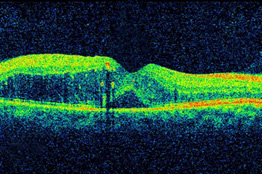This blog highlights research and development of new treatments, outcomes of global clinical trials and their regulations, with a special focus on ophthalmology and retinal diseases, including drugs and devices. The blog is meant for both clinical and pharmaceutical experts, as well as for patients / family members who are looking for information.
Wednesday, November 15, 2017
FDA approves the first digital pill that tracks compliance
| Source: Proteus Digital Health |
Tuesday, November 14, 2017
Studies show stem cell-based treatment safe in macular degeneration
Results from two early clinical trials show that it may be possible to use human embryonic stem cells as treatment for the dry form of macular degeneration, according to presentations at the American Academy of Ophthalmology Annual Meeting 2017 in New Orleans, LA. Stem cells injected into the eye appear to have replaced the missing cells damaged by the disease, with no serious side effects.
Saturday, November 4, 2017
Does performing/undergoing surgery in the afternoon reduce the risks?
 |
| (c) Genetic Literacy Project |
A new study suggests patients undergoing open heart surgery in the afternoon have a lower risk of potentially fatal complications than those undergoing operations in the morning. The study found that events including heart attacks and heart failure were less common among those who had undergone a valve replacement operation in the afternoon. The finding appears to be linked to the ability of the heart tissue to recover after being starved of blood supply during surgery – an effect the researchers say is influenced by the cells’ biological or “circadian” clock.
Friday, November 3, 2017
The first dual-action Glaucoma drug, Vyzulta, approved by FDA
 |
| (c) AAO |
Orion, the Cortical Visual Prosthesis System, gets full FDA approval
 |
| (c) medgadget.com |
Tuesday, October 31, 2017
Converting to Eylea from Avastin may benefit Patients with Diabetic Macular Edema
| (c) British Journal of Ophthalmology |
Monday, October 30, 2017
Beware: Using colored contact lenses on Halloween may lead to blindness!
Whether you’re a ghost or zombie, vampire or witch, poor costume choices—including decorative (colored) contact lenses and flammable costumes—and face paint allergies can cause injuries that haunt you long after Halloween. Also remember what eating lots of sweet candy can do to your or your children's body.
It always pays to be aware and careful. Happy Halloween!
It always pays to be aware and careful. Happy Halloween!
Thursday, October 26, 2017
DNA & RNA editing - the future of disease management
Labels:
Anemia,
Blindness,
CRISPR,
Cystic Fibrosis,
DNA,
Editing,
Gene,
REPAIR,
RNA,
Sickle cell,
Therapy
Suprachoroidal injection - Clearside's approach to treating Diabetic Macular Edema
 |
| (c) NEI |
Wednesday, October 25, 2017
Leber Hereditary Optic Neuropathy - The Gene Therapy race to treatment
GenSight Biologics, which is in advanced stages of clinical development of gene therapy for Leber Hereditary Optic Neuropathy, has a new Chief Medical Officer. Barrett Katz, M.D., M.B.A., who until recently was the Professor of Ophthalmology, Neurology and Neurosurgery at the Montefiore Medical Center and the Albert Einstein College of Medicine in New York. Dr. Katz has worked in both academic medicine and the industry as a neuro-ophthalmologist, working as CEO of ophthalmic biotech Danube Pharmaceuticals, as well as CMO of Fovea Pharmaceuticals and VP of medical affairs and strategy at Eyetech.
Tuesday, October 24, 2017
Biosimilars and clinical care - information for healthcare providers - Part I
A significant number of people, both in clinics and in pharmaceutical industry, mention the fact that they keep hearing of the word 'biosimilars' in academic meetings and in discussions, but they have no idea what they are, and what they do. Considering that biosimilars are likely to affect the way we practice medicine in the days ahead, it is important that we are aware of what biosimilars mean, and what they do. Also, it is important from the pharmaceutical industry perspective that everyone is knowledgeable of the process for an approval. Lastly, there is a minuscule, but very relevant question, about legal implications, which may or may not break your/your company's back in getting the drug to the market! The last two topics will be covered in subsequent posts.
Subscribe to:
Comments (Atom)




